Hello pet people!
I've learned a lot since setting up my aquarium and caring for betta fish and snails, and while I'm not an expert by any means, I see a lot of people who are still being told bad information by pet store workers who don't know about their care. It doesn't help that pet shops still sell teeny tiny bowls that are too small for bettas but are specifically labeled as FOR bettas, so unless people go on a Google search or join a fish care group on Facebook or Reddit or something, how would they know?
20+ years ago in college, I too had bettas in bowls because I just believed the pet store worker's advice, and now I feel bad about it. Because I believe most people want to do right by their animal friends and give them happy homes, I thought I would write a little betta care guide and share what I've learned!
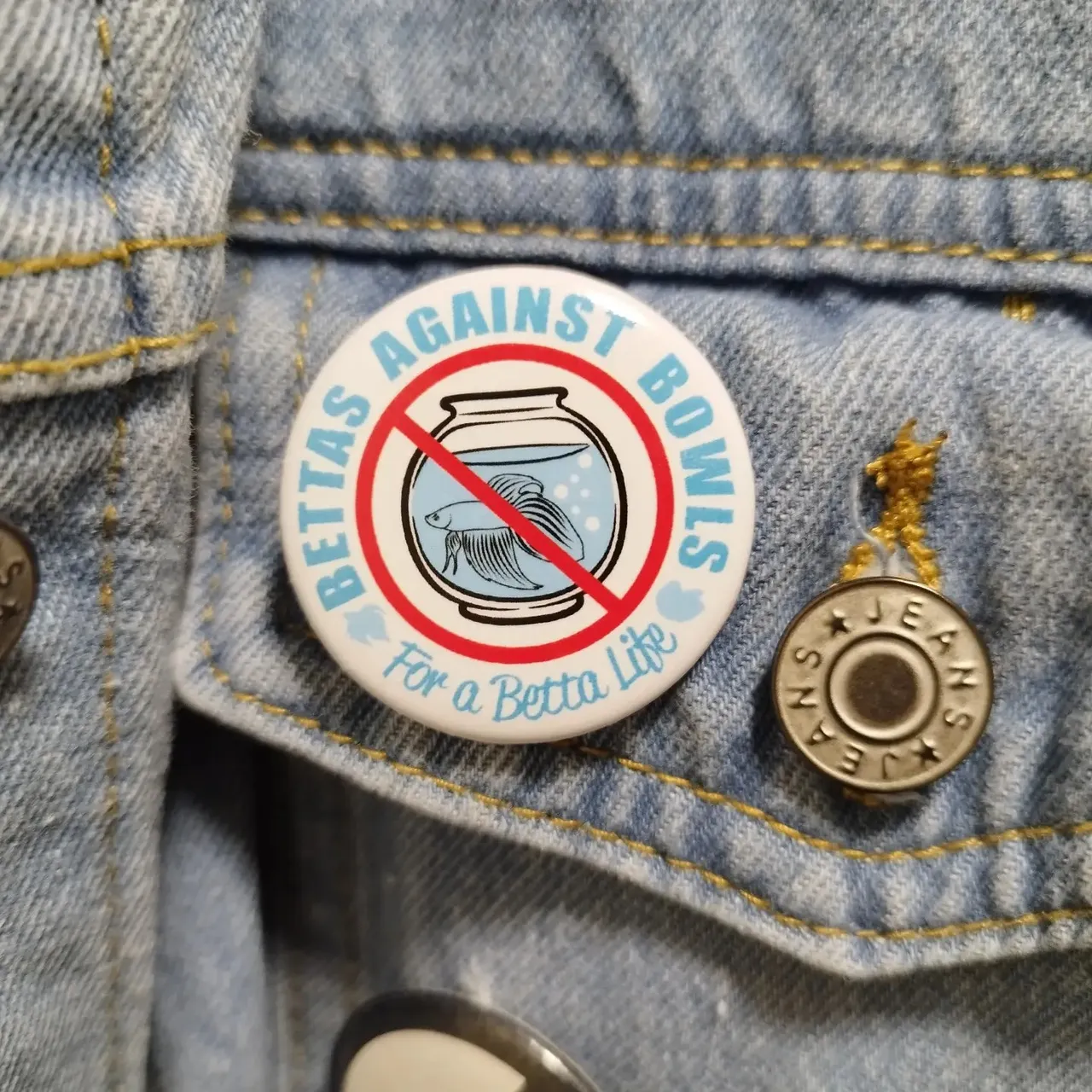
a pin I got for my jean jacket
Tank Size
Here is the most common misconception about betta fish. The recommended aquarium size for bettas is 5 gallons minimum, preferably 10 gallons! There are some exceptions - some disabled bettas who have crooked spines, or who have suuuuper long fins such that swimming exhausts them, or some elderly bettas - they might do well in a minimum 2.5 gallon tank with little to no water flow so it's easier for them to get around. But generally, bettas need a minimum 5 gallon size aquarium! Laeg is in a 10 gallon on my kitchen counter.
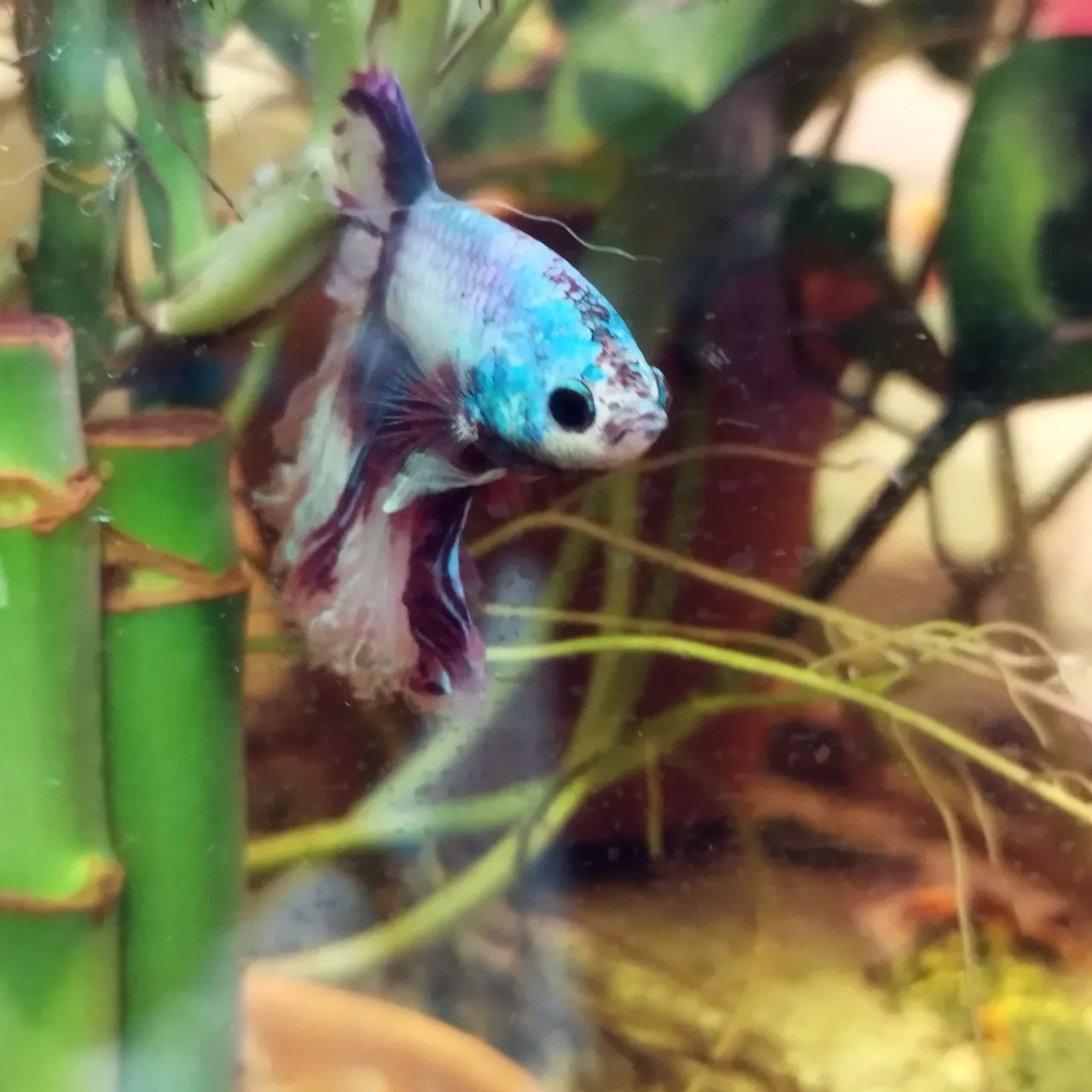
got any noms?
Water Parameters and Maintenance
Generally, the smaller the tank, the more precarious the balance is in terms of water parameters and keeping it clean. You'll want to learn about the nitrogen cycle (there are lots of good videos on this, I highly recommend Aquarium Co-op's videos on YouTube), and get either an API Master Test Kit for freshwater aquariums (As an Amazon Associate I earn from qualifying purchases. Thank you for supporting me!), or test strips (in which case, you'll need both a multi-in-one type like this one AND an ammonia-specific one like this one. Some aquarists swear that test strips aren't as reliable and only will use the API kit, but Corey from Aquarium Co-op says test strips are fine, so I trust him on that, but it's up to you. Ammonia is always separate from the other ones because the testing method is different with strips (with my 6-in-1s, I dip it for 2 seconds and don't shake excess water off; with the ammonia strips I dip it in and out of the water for 30 seconds and do shake excess water off). Here is a guide for what the right water parameters are for bettas.
If you are struggling with high nitrates, you can add more water-column-feeding live plants to the tank, which will eat them up. Pothos cuttings and floating plants do this especially well (I actually have to add extra fertilizer to my tank and struggle keeping floaters alive because I don't have enough nitrates, because my pothos eat them up so well!). If your pH is off, general advice is that stable pH is better than chasing a number, but if you want to try and adjust it, it's better to do it slooooowly; in this case to raise it, you can try using some crushed coral (1 lb. per 10 gallons), and to lower it, you can add botanicals like catappa leaves or mopani wood. Don't use quick-fixes like pH up or down chemicals, because they can shift it too fast and you'll constantly be having to dose to keep it stable.
You'll want a gravel vacuum like this one in order to clean the tank. You'll need to vacuum up the poop out of your substrate and do partial water changes (how frequently depends on the size of your tank and water parameters, but basically once every week or two), where you take out some of the dirty water and add fresh, clean water. Do not change all or most of the water on a regular basis or scrub the decorations in the tank, because you want the beneficial bacteria in there that convert fish waste (see again, the nitrogen cycle, but basically fish waste becomes ammonia and some beneficial bacteria convert that to nitrite, then others convert that to nitrate, which is both less harmful to your fish and also good plant food for your live plants). Changing too much of the water will probably result in a bacterial bloom (which will look like cloudy water) as they reestablish themselves (it's nothing to worry about if you see that happen, it's actually good that they are reestablishing themselves, but you want them to remain stable so that they are always processing your fish's waste). So when you do those water changes, maybe do 10-30% of your water volume and that's it. You will also need a product to remove any chlorine and/or chloramine in your water supply, because that is toxic to fish. A lot of people like Seachem products, but I use Dechlor.
A sponge filter is great for bettas because you can adjust the flow with a flow valve so it's not too strong for your fishy friend, help keep the water clean, and add oxygen to the water. I bought my sponge filter and air pump to run it separately, though you might find them together too.
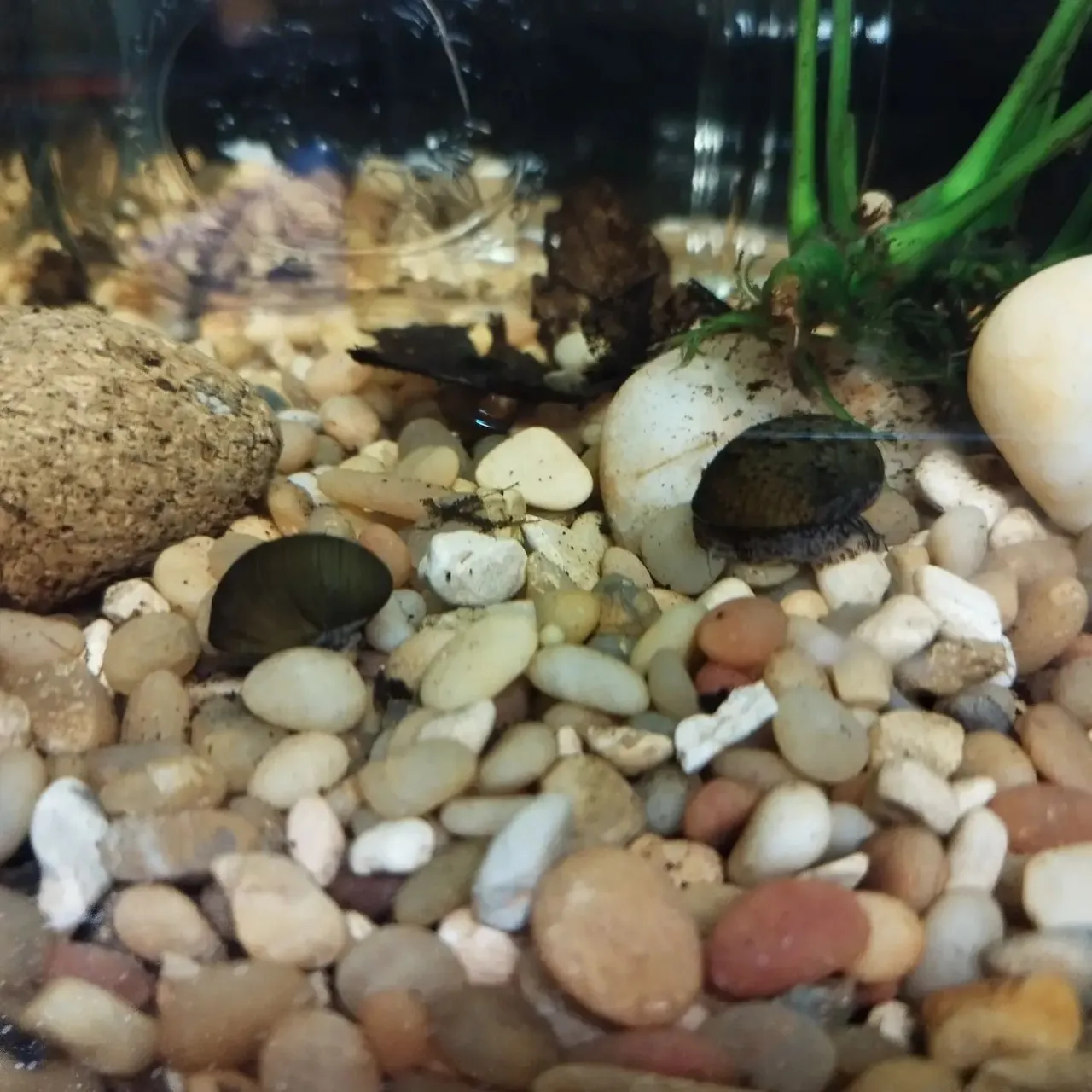
Macha and Sanglainn, two nerite snails
Food
The most important thing, according to Corey from Aquarium Co-op, is variety in your fish's diet. There are some foods that are healthier than others of course, but variety is the best way to ensure that they are getting all the nutrients they need. You'll see aquarists who insist on only feeding bettas live or frozen foods because that's supposed to be healthiest (but there are also some brands that have a reputation for being unsafe - according to fish groups, San Francisco Bay brand frozen foods are often unsafe, but Hikari and Omega One get good recommendations), but that's not always possible or maybe your betta just isn't interested in them. I think it's a bit like the "breast feed or formula" debate with human babies, and that "fed is best." But a quick and dirty recommendation for betta foods is that you want ones that have meat as the primary ingredient, since bettas are carnivores, instead of fillers that are plant-based.
Two highly recommended shelf-stable betta foods that Laeg enjoys are Fluval Bug Bites (betta formula granules) and NorthFin Betta Bits. He's also been enjoying Omega One betta buffet flakes, which I got for variety since he hadn't tried a flake texture before. I've tried freeze dried daphnia and freeze dried bloodworms for him too, but he's not interested in them! Which is surprising, since those bloodworms are generally like betta candy. He might like them frozen, but I'm not sure since he doesn't like them freeze dried.
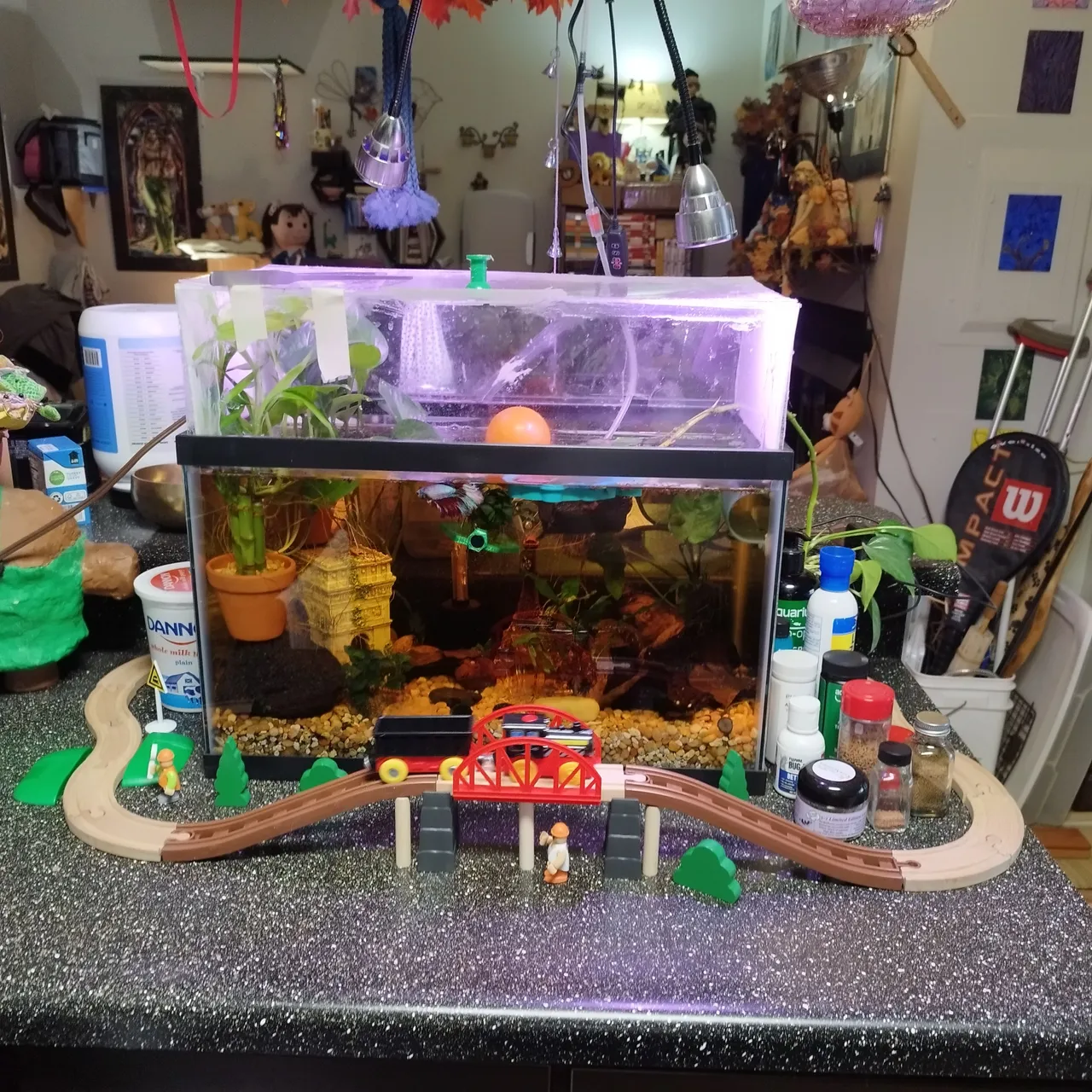
Enrichment and Decorations
Bettas are smart, and like to have places to explore, and places to rest, and places to hide. You want to be careful and not put in anything sharp that might tear their fins!
Since bettas have a labyrinth organ, they breathe air as well as getting oxygen from the water with their gills, and so they like to have resting areas near the top of the water. You can try a Floating Betta Log, which seem to be universally beloved, live plants, moss ledges (I got ours off of Etsy and put an Anubias nana petite plant on it instead of moss - it's the green thing in the middle near the top of the tank in the above photo), or SeeShelters (on the side of the tank on the right in the photo). If you get fake plants, get silk ones, as the plastic ones are likely too sharp and can possibly tear their fins. Aquarium plants is its own whole post, but they can really help keep the aquarium water safe for your fish friend if you can put in the effort (and money ...I've spent a lot on plants, lol).
Bettas are jumpers! So always have a lid (some people just keep the water level low enough that even if they jump they won't exit the tank? But I'd rather be safe and have a lid. Also, I have two snails in there and snails can be escape artists, too).
For a hide, I just used a Mason jar. You can also use a plain terra cotta pot if you block off any drainage holes so they don't get stuck (I'd avoid any with glazes since you don't know if those will leach into the water or not). You can also of course buy aquarium-specific hides from a pet store or Etsy. Some people in fish groups have reported that some aquarium decorations have the paint peeling off (!), which is not safe at all, so, beware of that. That tees me off since they are explicitly sold as safe for aquariums. >:(
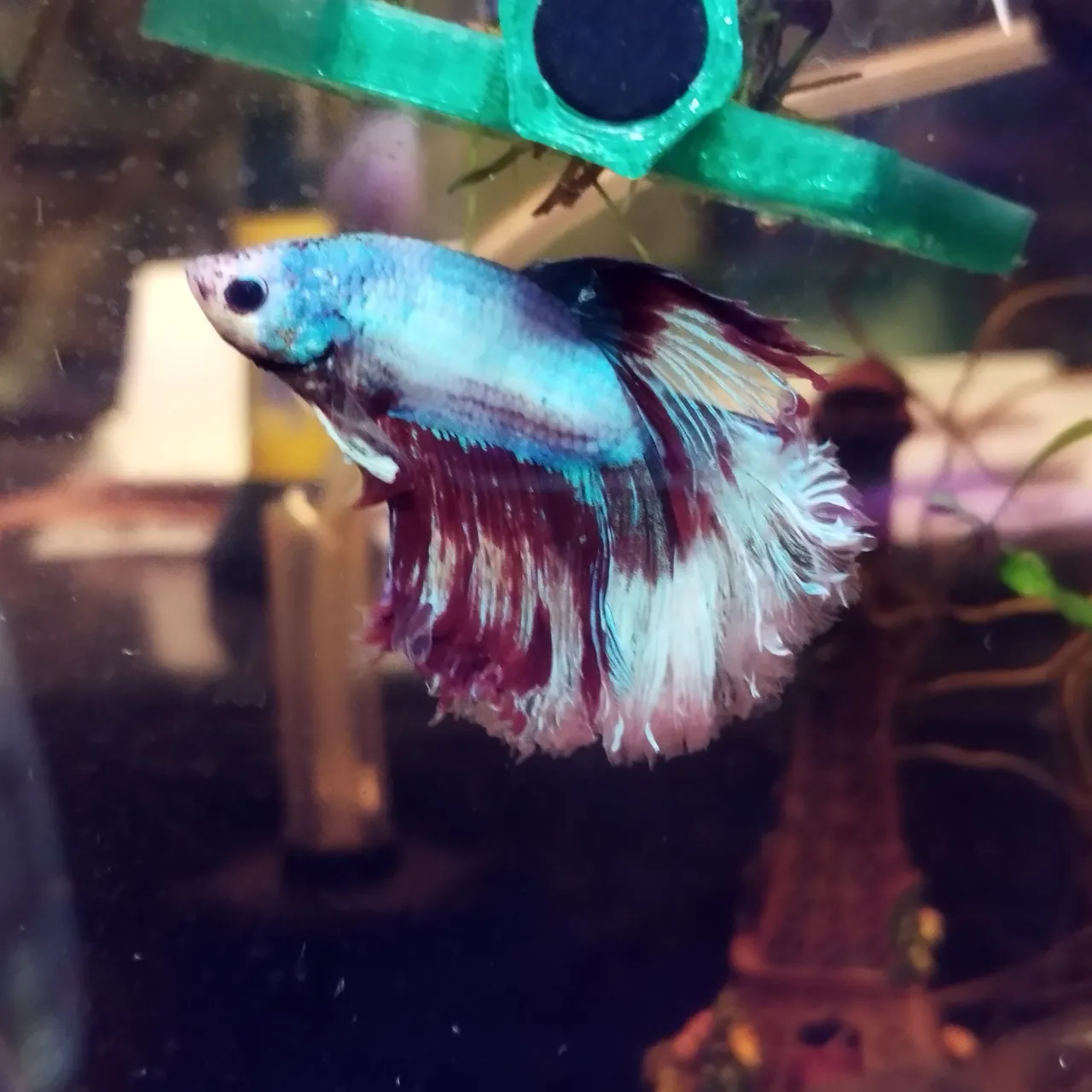
Laeg
Temperature
There again is some debate around this, but generally bettas are okay in temps between 76 and 82 F (some people say it's only 78 to 82). Since I am a human popsicle and like my apartment in the upper 70s-80 F myself, I don't have a heater in the tank and it stays at happy betta temps. I'm extra glad about that because I've heard many (too many) horror stories about heaters malfunctioning and killing the fish inside (!), so I'm glad to not be taking that risk. However, if you live in a cold place and/or keep the a/c on high, you're going to need a heater to keep things healthy for them. Too cold water can stress their immune systems and make them unhappy. So given that I don't have one, I don't have a specific heater recommendation, but generally in fish groups I see people say that there are ones that a) are adjustable where you set the temp and b) that automatically turn off once it reaches the right temp and that's what you want. Problems seem to be reported a lot more with ones that don't work that way, so I would avoid those.
I keep a thermometer like this one in my tank to make sure the temperature is good in there. :)
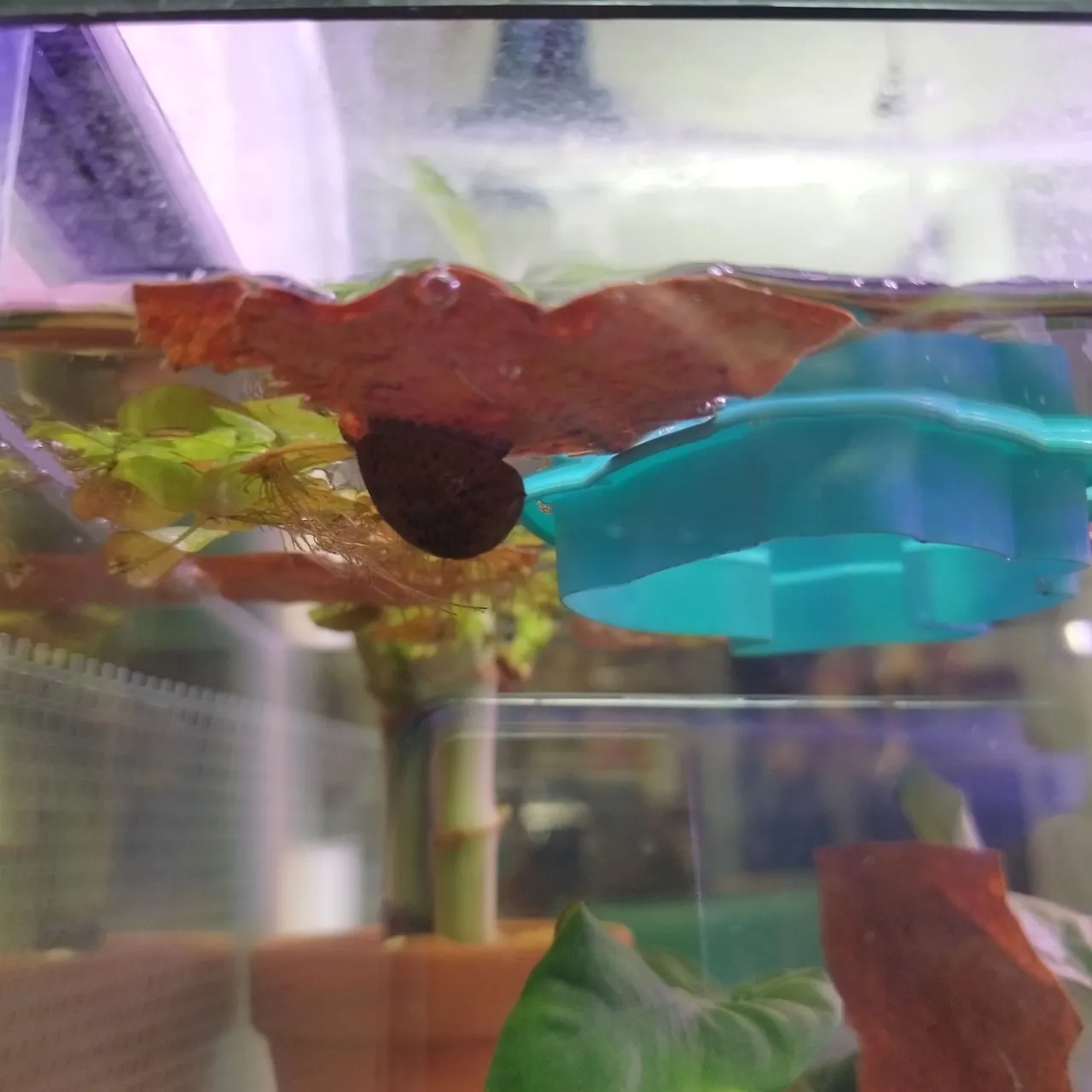
Sanglainn surfing on a catappa leaf
Tank Mates?
Bettas are pretty solitary animals, but you can sometimes, maybe keep them with certain tankmates. HOWEVER, big caveat here, as there are lots of hard nos and only a handful of maybes.
I chose nerite snails over mystery snails (what I had originally been thinking) because I heard enough stories of bettas biting off the snail's antennae that I didn't want to chance it (mystery snails have much larger antennae that the bettas probably thought were worms to eat). That being said, my first betta in recent times, CuChulainn (SIP), was very spicy and he often flared at Macha, so I'm glad I didn't get a mystery snail with him. On the other hand, Laeg is very chill so I think he could probably live with a mystery snail just fine.
If you google or look on YouTube, you'll find lists of recommended possible betta tankmates, but you always have to be ready for the possibility that it won't work out and you might need to separate them. For instance, one of the common recommendations is a school of tetras, because they are small and schooling so the betta shouldn't be able to zero in on one of them and pick them off. However, I have also seen stories in fish groups that sometimes the tetras fin nip the bettas, so it isn't always the betta who is the aggressor!
Some people successfully keep shrimp in the same aquarium as bettas, but many others find that the shrimp just become very expensive betta snacks, so I probably wouldn't try it. Maybe if you had a really big community tank with lots of places for shrimp to hide.
Sororities?
I am now anti-sorority (a sorority is the idea that you can keep a half dozen or more female bettas together in one large tank). Why? Because even many experienced aquarists have them fail. Even in really big tanks with tons of plants and hiding spots. Even when they followed all the advice. And a lot of the stories go something like, "the sorority lived peacefully together for a whole year, until one day I came home from work and it was a bloodbath." Something tipped the scales one day, and there was a throwdown. I wouldn't try it. In my opinion, it's too stressful for them, and you are basically gambling the whole time that something won't go wrong.
Divided tanks?
I wouldn't recommend these, either. There are also too many stories of bettas who knew the other was there, and would smash up against the divider until they hurt themselves, or jumped over it (I told you they were jumpers) and had their fight.
In short, you can have more than one betta ...in separate tanks. And make sure they can't see each other (put a solid divider in-between if the tanks are next to each other).
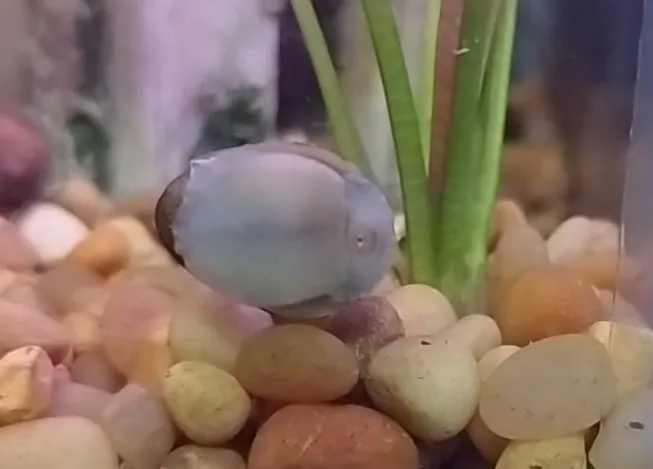
Macha the nerite snail
There is so much more we could get into, like plants or potential illnesses to look out for, but I hope this basic guide to betta care is a good reference for you to get started caring for your fish friend! Don't forget that there are lots of fish groups on Facebook, Reddit, forums, etc. and you can always look there for more information!
Thanks for reading and I hope your day goes swimmingly! ;)